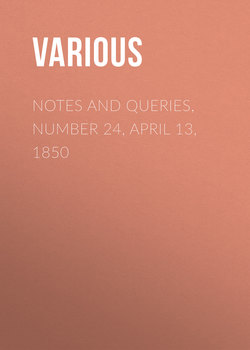Читать книгу Notes and Queries, Number 24, April 13, 1850 - Various - Страница 4
NOTES
LYDGATE AND COVERDALE, AND THEIR BIOGRAPHERS
ОглавлениеDan John Lydgate, as Warton truly observes, was not only the poet of his monastery, but of the world in general. Yet how has he been treated by his biographers? Ritson, in his Bibliographia Poetica, says, "he died at an advanced age, after 1446." Thomson, in his Chronicles of London Bridge, 2nd edition, p. 11., says, "Lydgate died in the year 1440, at the age of sixty;" and again, at p. 164. of the same work, he says, "Lydgate was born about 1375, and died about 1461!" Pitt says that he died in 1482; and the author of the Suffolk Garland, p. 247., prolongs his life (evidently by a typographical blunder), to about the year 1641! From these conflicting statements, it is evident that the true dates of Lydgate's birth and decease are unknown. Mr. Halliwell, in the preface to his Selection from the Minor Poems of John Lydgate, arrives at the conclusion from the MSS. which remain of his writings, that he died before the accession of Edward IV., and there appears to be every adjunct of external probability; but surely, if our record offices were carefully examined, some light might be thrown upon the life of this industrious monk. I am not inclined to rest satisfied with the dictum of the Birch MS., No. 4245. fo. 60., that no memorials of him exist in those repositories.
The only authenticated circumstances in Lydgate's biography (excepting a few dates to poems), are the following:—He was ordained subdeacon, 1389; deacon, 1393; and priest, 1397. In 1423 he left the Benedictine Abbey of Bury, in Suffolk, to which he was attached, and was elected prior of Hatfield Brodhook; but the following year had license to return to his monastery again. These dates are derived from the Register of Abbott Cratfield, preserved among the Cotton MSS. Tiber, B. ix.
My object in calling the attention of your readers to the state of Lydgate's biography is, to draw forth new facts. Information of a novel kind may be in their hands without appreciation as to its importance.
I take this opportunity of noticing the different dates given of Myles Coverdale's death.
Strype says he died 20th May, 1565, (Annals of Reformation, vol. i. pt. ii. p. 43., Oxf. ed.), although elsewhere he speaks of his as being alive in 1566. Neale (Hist of Pur., vol. i. p. 185.) says, the 20th May, 1567. Fuller (Church Hist., p. 65. ed. 1655) says he died on the 20th of January, 1568, and "Anno 1588," in his Worthies of England, p. 198., ed. 1662.
The following extract from "The Register of Burials in the Parish Church of St. Bartholomew's by the Exchange" sets the matter at rest. "Miles Coverdall, doctor of divinity, was buried anno 1568., the 19th of February."
That the person thus mentioned in the register is Miles Coverdale, Bishop of Exeter, there can be no doubt, since the epitaph inscribed on the tomb-stone, copied in Stow's Survey, clearly states him to be so. It is, perhaps, unnecessary to observe that the date mentioned in the extract is the old style, and, therefore, according to our present computation, he was buried the 19th of February, 1569.
Can any of your correspondents throw any light upon the authorship of a work frequently attributed to Myles Coverdale, and thus entitled, "A Brieff discours off the Troubles begonne at Frankford in Germany, Anno Domini, 1554. Abowte the Booke off common prayer and Ceremonies, and continued by the Englishe Men theyre, to the ende off Q. Maries Raigne, in the which discours, the gentle reader shall see the verry originall and beginninge off all the contention that hathe byn, and what was the cause off the same?" A text from "Marc 4." with the date MDLXXV. Some copies are said to have the initials "M.C." on the title-page, and the name in full, "Myles Coverdale," at the end of the preface; but no notice is taken of this impression in the excellent introductory remarks prefixed by Mr. Petheram to the reprint of 1846. If the valuable work was really written by Myles Coverdale (and it is much in his style), it must have been interspersed with remarks by another party, for in the preface, signed, as it is said by Coverdale, allusion is made to things occuring in 1573, four years after his death.
EDWARD F. RIMBAULT.
